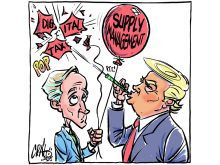Beckham is a farmer who writes from Winnipeg.
With a stronger minority but short of a majority, Stephen Harper in his victory speech promised to carry out the things he has committed to.
One of those things is the destruction of the Canadian Wheat Board.
He will no doubt wait to see the outcome of the vote for directors of the even-numbered districts, but no one should be under any illusions that, should that vote go against him, he will not be short of other nasty and quite possibly illegal efforts to put an end to the CWB.
Read Also

Agriculture needs to prepare for government spending cuts
As government makes necessary cuts to spending, what can be reduced or restructured in the budgets for agriculture?
On the face of it, it would appear that the farm vote is solidly behind Harper. But does the fact that farmers have sent to Ottawa some people who would make one wonder how they find their way out of their house in the morning, mean that they agree with Harper in the matter of the CWB? Time will tell.
Why does Harper hate the CWB?
He knows that only a small number of farmers want to get rid of it. He knows that it does an outstanding job for farmers in marketing and in standing up to such entities as the railroads, on behalf of farmers.
He knows that the returns to farmers are at least as good, and often better, than an open market would give them.
Harper is no dummy. So why the zeal to eliminate the CWB?
One thing we can dismiss at the outset is concern for farmers. He has never sought consensus in this battle, but has always taken a confrontational approach, spearheaded by such massive intellects as Chuck Strahl and Gerry Ritz.
He knows, when he says that he will walk over those who stand in his way, that he’s talking about bona fide farmers. And his election platform, while skimpy by any standard, was bereft of anything of substance for agriculture.
In the opinion of this writer, Harper wants to get rid of the CWB because he is first and foremost a deregulator, in the style of Margaret Thatcher and Ronald Reagan, and more recently George Bush.
His second reason, I believe, is because he sees a threat in the CWB in that it could morph into a political rallying point against him.
Do our present world conditions make deregulation and laissez faire capitalism a popular stance for either political or financial people to take?
After the most fervent deregulation government in modern history has resorted to the socialist type bailout of over $1 trillion to shore up its financial system, deregulation is in a bit of a bad flavour.
But against all evidence, our prime minister doesn’t seem to think so.
Or does he? When Nicolas Sarkozy was in Canada, he had the opportunity of addressing the Quebec Legislature. The French president in his address admonished Quebec separatists against trying to divide the country, stressing that we are in a time where consolidation, not separation, should be our goal.
He had barely time to close his mouth at the end of his speech before our prime minister, full of enthusiasm, almost climbed the podium in his haste to agree with Sarkozy’s comments.
So why is it good for banks, for credit unions, for countries to tighten up, to consolidate, to regulate, but a farm organization that has demonstrated that it can play with the big boys, that it can take on the railways, that it can protect quality control and raise the respect due to that quality worldwide, must be stripped of its mandate, disbanded and destroyed?
What is wrong with this picture and why are we even debating it?
The answer to the question is Harper’s political agenda.
As stated previously, he wants to get rid of the CWB because it could become a political rallying point against him.
Remember, it is Harper’s stated intention to change, permanently, the political complexion of Canada. He spent two years performing nothing less than character assassination on Stephane Dion to that end.
The CWB owes its origin and political support to the Liberal party, to men like Jimmy Gardiner, Eugene Whelan and others, men who were farmers, not the goon-like creatures called agriculture ministers that we have had the last couple of years.
Since the CWB is a creature in its origins, of the Liberal party, in Stephen Harper’s world, the CWB must be destroyed. It has nothing to do with freedom of choice.
If there is a single message that I would like to rivet on the minds of those few deluded souls who endlessly raise their caterwauling cry for choice, it would be this: Stephen Harper doesn’t care about you.
To him, you’re just a dumb bunch of farmers who will vote for him regardless, and who have a perennial whine that he can use in his drive to make us into a different country.
The country, in that inchoate wisdom that is so often seen in elections, has denied him a majority.
Farmers, in their sparse numbers, didn’t have much role in that decision, either pro or con.
But we can deny him a majority of yes-men at the CWB. Let us do so. It may be the most democratic thing we will ever do.
For me, it would be a most wonderful thing to see the CWB branch out.
I would like to see it in the input business. I would like to see trains with its logo have running rights on the tracks that those monopolies that Harper likes, Canadian National Railway and Canadian Pacific have as their money tree.
In the uncertain world in which we live, let us not get rid of something as valuable as the CWB. And don’t be lulled into thinking it can survive as one more grain company.
















